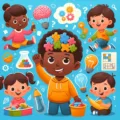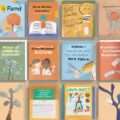Introduction
Social-emotional learning (SEL) focuses on developing skills like self-awareness, responsible decision-making, relationship building, and handling challenging situations constructively. Teaching these skills early helps set children up for success.
There are many engaging ways to foster SEL skills – including activities, games, and worksheets. When thoughtfully incorporated into the school day or home life, they can support children’s overall wellbeing.
Benefits of Social Emotional Learning
Some benefits of SEL include:
- Better academic performance
- Improved behavior and classroom climate
- Higher self-confidence and self-control
- Better skills in areas like communication, collaboration, empathy, and problem solving
45+ Fun SEL Activities and Games
Here are over 45 fun, hands-on ways to teach social-emotional skills:
For Self-Awareness and Self-Management
- Feelings charades – Act out different emotions and have others guess what you’re feeling
- Create a feelings journal to write or draw about your emotional states
- Self-portrait activity – Have students draw pictures of themselves and what makes them unique
- Role playing various scenarios that involve regulating your emotions and behavior
For Social Awareness and Relationship Building
- People bingo – Mingle around the room and find classmates that fit each description
- Friendship bracelets craft – Make and exchange bracelets with kind words about one another
- Compliment circle – Go around sharing appreciative words about each person
- Mix and mingle game – Practice introducing yourself to new people
For Responsible Decision Making
- What would you do? Dilemmas – Discuss solutions to hypothetical situations
- Pros and cons game – Weigh decisions and possible outcomes
- Group challenge course – Work together to solve problems and reach goals
- Voting and surveys – Practice decision making in groups
SEL Worksheets and Printables
Alongside games and activities, worksheets and printables allow students to reflect individually. Some options include:
- Feelings check-in sheet
- Calming strategies coloring pages
- Kindness bingo boards
- Goal setting templates
- Decision making graphic organizers
FAQ
What are some low-cost SEL activities?
Many SEL activities require no supplies at all. Examples include role playing, class discussions, self-reflection questions, mix and mingle games for meeting new people, compliment circles, and more.
How do you track SEL skills?
You can track SEL development through methods like self-reviews, peer reviews, teacher observations, rubrics, checklists of skills, and reflection journals. Pre and post assessments also help gauge growth.
What are common SEL challenges?
It can be challenging getting started teaching these non-academic skills or finding time during busy school days. Teacher training, lesson plans, and weaving activities seamlessly into academic content can help overcome hurdles.
What SEL skills should students learn?
Experts identify five core competencies: self-awareness, self-management, social awareness, relationship building, and responsible decision-making. These lay the foundation for better adjustment, wellness, and academic success.
Why is SEL important for kids?
SEL helps kids recognize emotions, show empathy, build relationships, make thoughtful choices, handle adversity, defuse conflict, embrace diversity, and thriving academically and in life.









